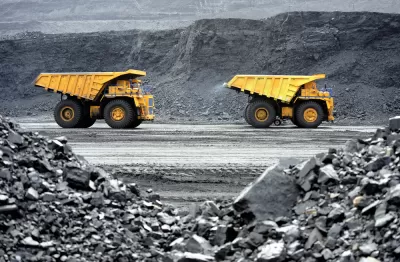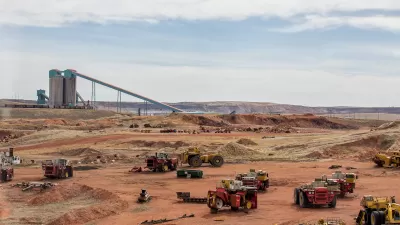It's only taken a week for the coal industry to get swept under the rug, to an extent, by Republican leadership in Washington, D.C.—not to mention their energy market competitors.

"ExxonMobil has just dropped a tweet in support of putting the Paris climate agreement into force," according to a post by Tina Casey. "Connect the dots, and that means the Trump Administration is poised to throw coal under the bus."
The tweet came from Suzanne McCarron, ExxonMobil's Vice President of Public and Government Affairs, and reads as follows while linking to the Paris Climate Agreement.
The Paris agreement is an important step forward by governments in addressing the serious risks of #ClimateChange https://t.co/X7JubyyArv
— Suzanne McCarron (@SuzanneMcCarron) November 10, 2016
Before the end of the article, Casey casts doubt on the seriousness of this pro-environmental statement from McCarron, noting the company's shift toward shale gas reserves.
A big component of the story, however, is coal's position as a political and economic power. "This is probably not what the US coal industry had in mind when it lobbied — successfully — to put a President Donald Trump in charge of US energy policy," writes Casey, and events since Election Day have hinted at a rude awakening for the coal industry (from executive levels down to the laid-off workers who voted for Trump hoping that he would revive the industry). A separate article by Joseph Garth reported that "U.S. Senate Majority Leader Mitch McConnell hedged on Friday about when and if Republicans would be able to bring coal mining jobs to Kentucky, saying that is a 'private sector activity.'"
FULL STORY: Stabbed In The Back! ExxonMobil Throws Shade At US Coal Industry

Maui's Vacation Rental Debate Turns Ugly
Verbal attacks, misinformation campaigns and fistfights plague a high-stakes debate to convert thousands of vacation rentals into long-term housing.

Planetizen Federal Action Tracker
A weekly monitor of how Trump’s orders and actions are impacting planners and planning in America.

In Urban Planning, AI Prompting Could be the New Design Thinking
Creativity has long been key to great urban design. What if we see AI as our new creative partner?

King County Supportive Housing Program Offers Hope for Unhoused Residents
The county is taking a ‘Housing First’ approach that prioritizes getting people into housing, then offering wraparound supportive services.

Researchers Use AI to Get Clearer Picture of US Housing
Analysts are using artificial intelligence to supercharge their research by allowing them to comb through data faster. Though these AI tools can be error prone, they save time and housing researchers are optimistic about the future.

Making Shared Micromobility More Inclusive
Cities and shared mobility system operators can do more to include people with disabilities in planning and operations, per a new report.
Urban Design for Planners 1: Software Tools
This six-course series explores essential urban design concepts using open source software and equips planners with the tools they need to participate fully in the urban design process.
Planning for Universal Design
Learn the tools for implementing Universal Design in planning regulations.
planning NEXT
Appalachian Highlands Housing Partners
Mpact (founded as Rail~Volution)
City of Camden Redevelopment Agency
City of Astoria
City of Portland
City of Laramie



























